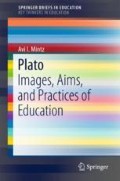Abstract
Plato led a school of his own, the Academy. This chapter explores the Academy and compares it to the school of Isocrates, the other most important Athenian experiment in higher education in Plato’s lifetime. In the schools of Plato and Isocrates, the two most influential, if competing, purposes of Western higher education were developed and practiced.
Access this chapter
Tax calculation will be finalised at checkout
Purchases are for personal use only
Notes
- 1.
Pythagoras himself, according to one account, offered lessons to boys and married women (Pyth. 269).
- 2.
The description of the life of the Academy in Plato’s lifetime that I provide here is based primarily on Baltes’ (1993) highly readable and engaging overview, which, as a bonus, offers extensive notes to the sources on which his portrait is based. See also (Dillon 2003, pp. 2–10).
- 3.
For the relevant sources and an interpretation, see Natali and Hutchinson (2013, pp. 18–24).
- 4.
Aristotle’s Lyceum, which also may be pointed to as the forerunner of universities as research institutions (see Natali and Hutchinson 2013), expanded the scope of Plato’s model.
- 5.
The genre of advertisements for and exhortations to philosophy, or protreptic, has received increasing attention of late. For an analysis of protreptic in Plato and Isocrates see Collins (2015).
- 6.
For a clear overview of the aims, curriculum, and pedagogical method of Isocratean education, see Marsh (2010).
- 7.
On Plato’s and Isocrates’ legacies in higher education, see Kimball (1983), (1995).
Author information
Authors and Affiliations
Corresponding author
Rights and permissions
Copyright information
© 2018 The Author(s)
About this chapter
Cite this chapter
Mintz, A.I. (2018). Higher Education and Plato’s Academy in Classical Greece. In: Plato. SpringerBriefs in Education(). Springer, Cham. https://doi.org/10.1007/978-3-319-75898-5_6
Download citation
DOI: https://doi.org/10.1007/978-3-319-75898-5_6
Published:
Publisher Name: Springer, Cham
Print ISBN: 978-3-319-75897-8
Online ISBN: 978-3-319-75898-5
eBook Packages: EducationEducation (R0)

